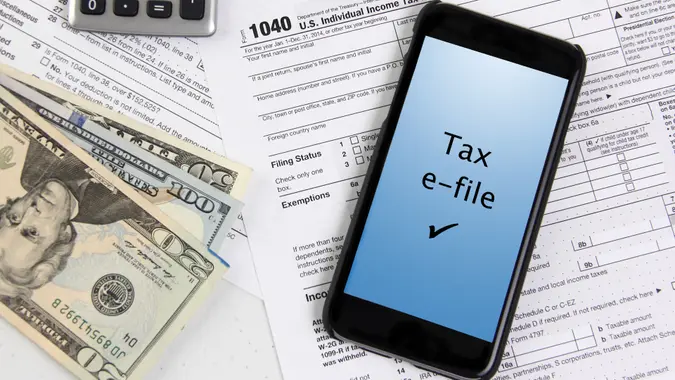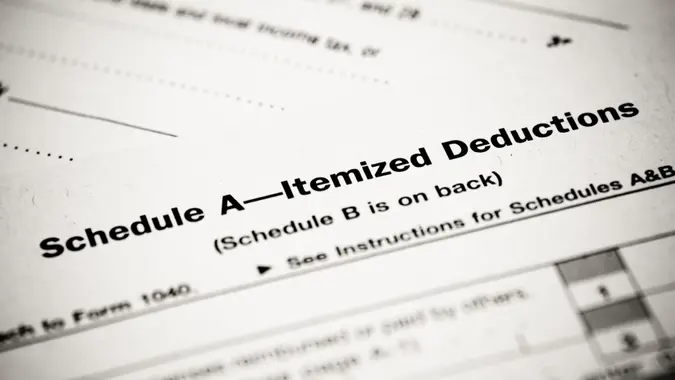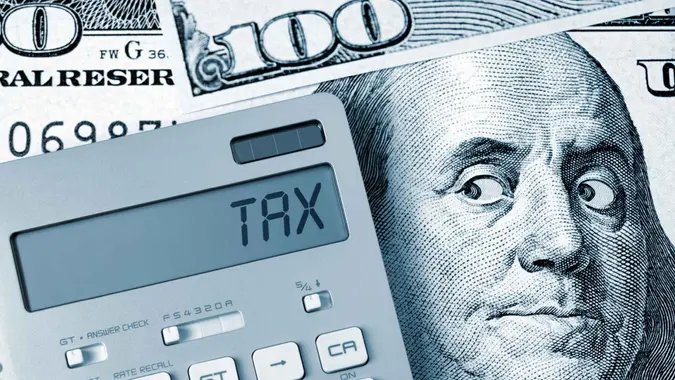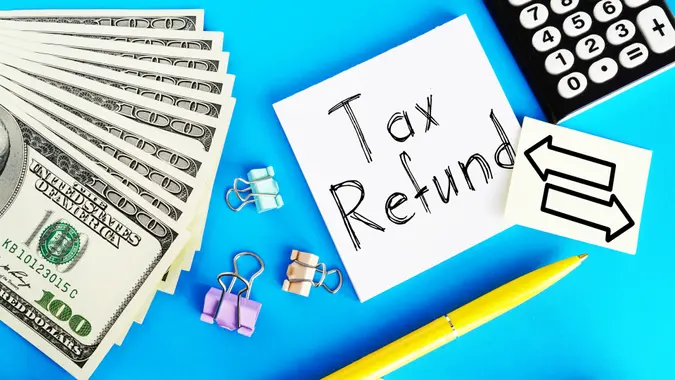What Is a Tax ID Number and How Is It Used?

Commitment to Our Readers
GOBankingRates' editorial team is committed to bringing you unbiased reviews and information. We use data-driven methodologies to evaluate financial products and services - our reviews and ratings are not influenced by advertisers. You can read more about our editorial guidelines and our products and services review methodology.

20 Years
Helping You Live Richer

Reviewed
by Experts

Trusted by
Millions of Readers
A tax identification number (TIN) is a unique nine-digit number issued to anyone who pays personal or business taxes. You can get this number from the Social Security Administration (SSA) or the Internal Revenue Service (IRS). You’ll need it when filing taxes and for other verification purposes as well. Read on to learn which type of TIN you need and how to apply.
Tax Identification Number Quick Guide
A TIN is a number the IRS uses to recognize individuals and businesses for tax reporting and tracking. It’s a broad category that includes several different types of identification numbers.
Here are the different types of TINs:
- Social Security number (SSN): You’ve likely heard of an SSN if you’re a U.S. citizen or permanent resident. It is a nine-digit number issued by the SSA.
- Employer identification number (EIN): This number is commonly used by businesses, trusts and estates.
- Individual taxpayer identification number (ITIN): An ITIN is a type of taxpayer identification number assigned by the IRS to people who are not eligible for a SSN. It’s commonly used by certain dependents, nonresident aliens and others who need to file taxes or be listed on tax documents.
- Adoption tax identification number (ATIN): An ATIN is issued as a temporary identification number for children being adopted in the U.S. This number is issued when an SSN is not available.
- Preparer tax identification number (PTIN): This is a unique number issued to those who prepare or assist in preparing U.S. Federal tax returns for compensation.
Why Tax Identification Numbers Matter
You’ll need your tax ID number to be able to file your taxes, and it’s how the IRS tracks tax compliance. Without a tax ID number, it is illegal to work and earn taxable income in the U.S.
Tax ID numbers are also used for identity and financial verification in many other instances. For example, an employer may use your tax ID number to verify your identity to be eligible for a job. Or a bank may use your tax ID number when applying for a mortgage or opening a bank account.
If you live and work in the U.S., it’s important to have the right tax ID number to ensure compliance with the IRS and the ability to verify your identity nationwide.
Types of Tax Identification Numbers
Here’s a side-by-side look at different tax identification numbers and how they compare.
| TIN Type | Issued By | Purpose | Special Notes |
|---|---|---|---|
| SSN | SSA | Identifies individual for taxes and benefits | -Most commonly used TIN type -Used by U.S. citizens and permanent residents |
| ITIN | IRS | Number used when the individual isn’t issued a SSN | -Used by nonresidents and dependents -Immigration without work authorization |
| EIN | IRS | Identifies business/trust and estates for tax filings | -Required for businesses |
| ATIN | IRS | Children who are being adopted will be issued this number | -Number is issued to children before they receive SSN |
| PTIN | IRS | Number is issued by paid tax preparers | -Must be renewed every year |
SSN
- Who needs it: U.S. citizens, permanent residents and individuals legally authorized to work in the U.S.
- How it is used: The number is used for tax reporting, employment verification, government benefits, banking and credit history.
- Limitations: The number cannot be used for businesses. You need to protect your number to prevent identity theft.
ITIN
- Who needs it: Individuals who need to file taxes or tax statements but do not have a SSN. This includes nonresident aliens, certain dependents and foreign spouses.
- How it is used: Federal tax reporting and on tax returns
- Limitations: You are not allowed to use this number for work authorization or Social Security benefits.
EIN
- Who needs it: Businesses, employers, LLCs, corporations, nonprofits, estates and trusts
- How it is used: It is used for business tax filings, payroll reporting, opening business bank accounts and applying for business licenses.
- Limitations: The number cannot be used as an SSN for personal taxes.
ATIN
- Who needs it: Parents need this number when in the process of adopting a child.
- How it is used: It allows parents to claim the child as a dependent and qualify for adoption-related tax benefits.
- Limitations: This is a temporary number. Once the child receives an SSN, this number no longer applies.
PTIN
- Who needs it: Anyone who prepares taxes for compensation.
- How it is used: This number is placed on tax returns instead of the preparer’s SSN.
- Limitations: Must be renewed annually
How To Apply for a Tax Identification Number
If you need to apply for a tax ID number, here’s how it works:
Social Security Number
You can request a Social Security card from the SSA. To get one, you’ll need to do the following:
- Fill out Form SS-5.
- Provide documentation such as a driver’s license, birth certificate and evidence of immigration status (if applicable).
Employer Identification Number
If you’re a business that is required to obtain an EIN, you can apply online or by mail through the IRS. Be ready to do the following:
- Submit Form SS-4.
- Have a valid taxpayer identification number handy to complete the application online.
Individual Taxpayer Identification Number
To apply for an ITIN, you’ll need to take the following steps:
- Submit Form W-7 to the IRS.
- Provide documentation substantiating foreign or alien status and true identity for each applicant.
You can submit Form W-7 by mail, in person at an IRS office or through an Acceptance Agent authorized by the IRS.
When Is a TIN Required?
There are several scenarios where a TIN is required:
- Filing taxes: You must include your TIN on your tax returns, statements or other tax-related documents that are prepared and submitted to the IRS.
- If you’re a business: If you’re required to provide a withholding certificate or claim treaty benefits, you must have a TIN.
- Making payments: If you’re a business making payments to contractors or vendors must present their TIN.
The Bottom Line
Your tax ID number makes sure you are in compliance with the IRS. It can also verify your identity in important circumstances. As an individual taxpayer, your employer will use your tax ID number to track your income and report it to the IRS.
All tax IDs are designed to help you function as a taxpayer in the U.S. If you have any issues with your tax ID or need help, you’ll want to reach out to the SSA or IRS for assistance.
FAQs About Tax Identification Numbers
Here are the answers to some commonly asked questions about tax ID numbers.- Is my SSN my tax ID number?
- If you're a U.S. citizen or a permanent resident, your SSN is your tax ID number.
- Where can I find my tax ID number?
- You can find your tax ID number on your Social Security card, tax returns, W-2 or other official government documents.
- Is a tax ID the same as an EIN?
- Not necessarily. An EIN is a type of tax ID. An EIN is a number used to identify businesses.
- Is a TIN the same as an SSN?
- No. A SSN is a type of TIN.
Jacob Wade contributed to the reporting for this article.
Our in-house research team and on-site financial experts work together to create content that’s accurate, impartial, and up to date. We fact-check every single statistic, quote and fact using trusted primary resources to make sure the information we provide is correct. You can learn more about GOBankingRates’ processes and standards in our editorial policy.
- IRS. "Taxpayer Identification Numbers (TIN)."
- Social Security Administration. "Meaning of the Social Security Number."
- IRS. "Individual Taxpayer Identification Number."
- IRS. "Adoption Taxpayer Identification Number."
- IRS. "Frequently Asked Questions: PTIN Application/Renewal Assistance."
- IRS. "Frequently Asked Questions: Do I Need a PTIN?"
- IRS. "Tax Season Refund Frequently Asked Questions."
- Social Security Administration. "Request Social Security number for the first time."
- IRS. "About Form W-7, Application for IRS Individual Taxpayer Identification Number."
- IRS. "About Form 1041, U.S. Income Tax Return for Estates and Trusts."
- IRS. "PTIN requirements for tax return preparers."
- IRS. "Adoption taxpayer identification number."
- Social Security Administration. "Application for a Social Security Card."
 Written by
Written by  Edited by
Edited by 























